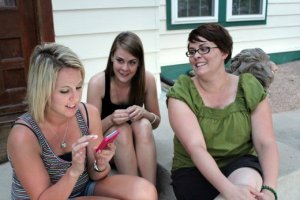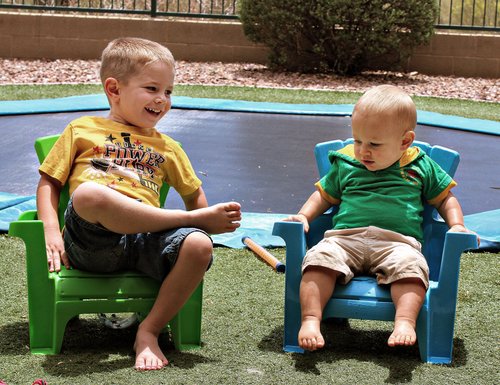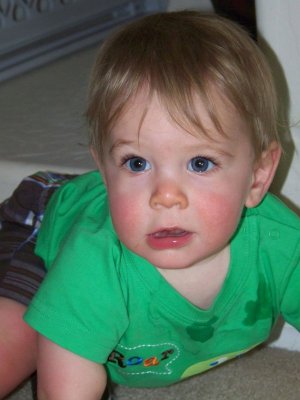Photo replay: Brothers — Live!
/In less than a week I get to see these brothers, live and in person!

Today's question:
Who are you most excited to see in the coming week?
for grandmothers and others
Grandma's Briefs is for grandmothers and others. Bits on the good, bad, humorous and heartwarming of being a baby boomer, grandparent, parent to adult children, wife and writer. Features include lifestyle articles, reviews, recipes, grandma profiles, and more.
In less than a week I get to see these brothers, live and in person!

Today's question:
Who are you most excited to see in the coming week?
In my family, there's not much of a tradition of close, loving, secret-sharing relationships between the female siblings. I read in books, see in movies, even observe in some of my friends and their sisters the ideal sisterly state. In the real world, though, in my real world that's flush with far more females than males, it just hasn't been. Not for those sisters who came before me nor for those who've come after.
My mom and her two sisters clearly love one another, but I'd venture to say calling each other best friends would be pushing it. My sisters and I? Well, we did—and do—love one another, but in a group of five females, you can imagine the competitions, the cat fights. Or maybe you can't, if you're one of the fortunate ones who indeed calls your sister your best friend.

It saddens me that somehow, somewhere, the sisters-as-best-friends gene seems to have skipped generation after generation after generation in my family. I envy those sisters for whom the sappy adages cross-stitched on pillows and emblazoned across coffee mugs ring true. I wanted that. I wanted that for my daughters.
When it comes to my grandsons, though, they do have that. And what a heartwarming delight it is to see. Bubby and Mac are unabashedly best buds, best friends who love and cherish, adore and idolize one another. Countless times during their visit I witnessed one reaching out to the other just to cuddle or kiss, share a toy or a moment. Sometimes I'd see one little hand pat a shoulder, an arm, a cheek as if they simply needed assurance their best buddy was still there.
Just as many times, I watched one hop on the other as though a bell audible to only them had been rung, signaling the start of a wrestling match. They'd giggle and roll and squeal in delight. Then just as quickly, the match would be over and they'd move on to another activity, together or solo, secure in knowing their brother, their best friend, was nearby if the urge to wrestle and wrangle struck once again.

Of course Bubby and Mac argue, compete for attention, clamor for the very same toys and don't hold back physically or vocally in challenging one another for what they feel is rightfully theirs. But once the victor is declared—by virtue of who's most determined to get their way or by virtue of Mommy or another adult breaking up the bickering—they're right back to lovin' on one another. No grudges, no resentment.
I'm not sure how it happened. I don't know whether Megan subconsciously—or consciously—did something absolutely perfectly right in creating the connection between the boys, instilled something that eluded me when raising my girls, or if it's just luck of the draw and she came up with the winning and perfectly matched pair.
Whatever the reason, whatever the cause, I'd say that Bubby and Mac are the true winners. I hope their winning streak continues. They'll always be brothers, of course. I'm crossing my fingers and saying my prayers that they'll always—and in all ways—be best friends, as well.
Today's question:
Which of your siblings did you consider your best friend as children?

Saturday is Baby Mac's first birthday party. You know, the party I won't be going to. Well, yesterday I mailed the birthday gift from PawDad and me to our youngest grandson. Megan called while I was preparing the package for mailing, and I felt compelled to tell her that I was not including something for Bubby in the box.
I realized it was an issue we'd not yet addressed, the even-steven-if-one-gets-something-the-other-gets-something-too conversation, because Bubby had been the one and only child up until his little brother came along nearly a year ago.
"The package is only for Baby Mac," I said. "It's his birthday, not Bubby's, and I won't be including a small gift for Bubby just because Baby Mac gets something."
"That's fine, Mom," she assured me. "That's not how our family rolls."
I was glad to hear that, as that's not the way our family ever rolled, either, when my daughters—Megan included—were young. As is often the case when a young family and new parents (like Megan and Preston) figure out what traditions and practices they will and will not use from their childhood when raising their own kids, I didn't want to assume Megan would do as we did, not as Preston's family did.
I don't know that Preston's family followed the even-steven-amongst-siblings rule. I'm guessing they didn't. But Megan and Preston may have a different philosophy than either of their families of origin, and I thought it important to let Megan know this grandma still doesn't roll that way and doesn't plan on reversing her rolling motion, regardless.
Baby Mac's birthday will be the first occasion that he receives gifts and Bubby doesn't—unlike Christmas and Valentine's Day and Easter. As Megan says, the event "will be interesting" as Bubby gets an important lesson in not being center stage, not being the primary recipient of all the spoils.
Though some might think it harsh, I wasn't willing to give Bubby any spoils on Baby Mac's birthday. Hence the sole gift in the package to the desert family being just for Baby Mac.
Bubby is usually an empathetic little boy, and Baby Mac's party will be his opportunity to realize that empathy includes not only when you feel bad for another, but when you feel good for them, too. Just as I wanted my daughters to empathize with others—especially their sisters—during good times and bad, I want my grandson to learn the same. I want him to be happy for others when good fortune comes their way, to delight in good things happening to those he loves, even when it's something he would oh-so-much love to happen to himself, too.
Jealousy, bitterness, envy, schadenfreude are all such easily learned feelings, attitudes, behaviors. They come naturally, it seems. No one has to teach little boys and girls such concepts, they just simply happen—even if those boys and girls don't know how to define them, what word to attach to them (or how to spell those words, such as schadenfreude, which I still have to look up).
The opposite of such things, though, seemingly must be taught, require lessons. Things such as compassion, goodwill, and sincere delight in another's good fortune.
Sometimes those lessons are learned the hard way.
Sometimes those lessons are learned the easy way—at least incrementally.
And sometimes those lessons are learned by not receiving a gift from Gramma or anyone else when your brother gets one.
It's a new lesson for Bubby, one I hope he accepts, appreciates, and takes to heart without making things too "interesting" for Megan.
I have faith in Bubby and expect it to not be too difficult a lesson for him. Because at his core, Bubby is a kind-hearted kiddo who usually does consider the feelings of others and willingly takes a backseat when necessary.
And because his birthday is just a couple weeks after Baby Mac's. He'll surely take comfort in knowing that Baby Mac will soon get that very same lesson—and at a far younger age than Bubby did.
Today's question:
Was the even-steven-amongst-siblings rule practiced in your family when you were young? What about with your own children? With your grandchildren?
Bubby and Baby Mac enjoying Mickey Mouse Clubhouse—and each other:
April 28, 2012
Today's question:
Who were the stars of the show when you last watched Mickey Mouse Club?
Bubby, my first grandson, at nine months old:

Baby hair everywhere.
Baby Mac, my second grandson, at nine months old:
Baby hair buzzed.
To be continued ... !
Today's question:
When did you last cut someone else's hair and how did it turn out?
Grandma's Briefs is for grandmothers and others. Bits on life's second act and the empty nest: the good, bad, humorous and heartwarming of being a baby boomer, grandparent, parent to adult children, wife and writer. Features include lifestyle articles, movie reviews, recipes, product reviews, auto test drives, grandma profiles, and more.

Thank you for visiting Grandma's Briefs, where I share my snippets, er, briefs on the good, bad, humorous, and heartwarming of being a grandmother, baby boomer, parent to adult children, wife, and writer. Learn more about me here. And email me any time at lisa@grandmasbriefs.com.

Jim (aka PawDad) and Lisa (me)

Brianna (oldest daughter) and hubby Patrick with Benjamin, Robert, and James

Megan (middle daughter) with hubby Preston and Declan, Camden, and Brayden

Andrea (youngest daughter) with me at a recent concert

Click here for The First-Time Grandmother’s Journal on amazon.com
click here for a love journal: 100 things i love about grandma on amazon.com
I do not share personal information with third parties nor do I store information I collect about your visit to Grandma's Briefs for use other than to analyze content performance through the use of cookies, which you can turn off at any time by modifying your Internet browser's settings. I am not responsible for the republishing of the content found on this blog on other Web sites or media without my permission. This privacy policy is subject to change without notice.

Grandma's Briefs, Grilled Grandma and all content unless otherwise noted Copyright ©2025, Lisa Carpenter. All rights reserved.